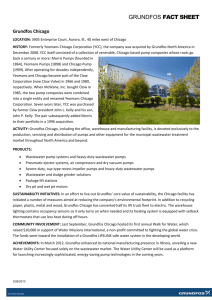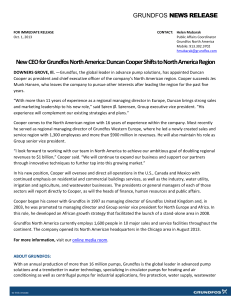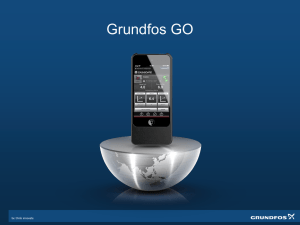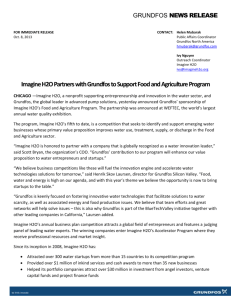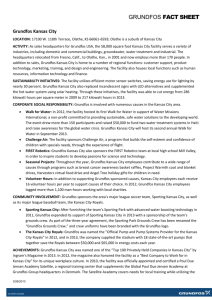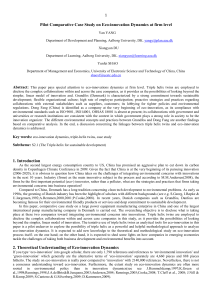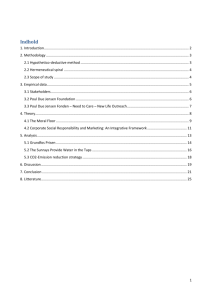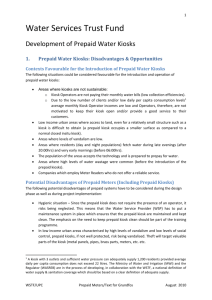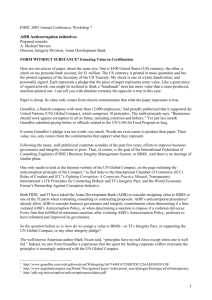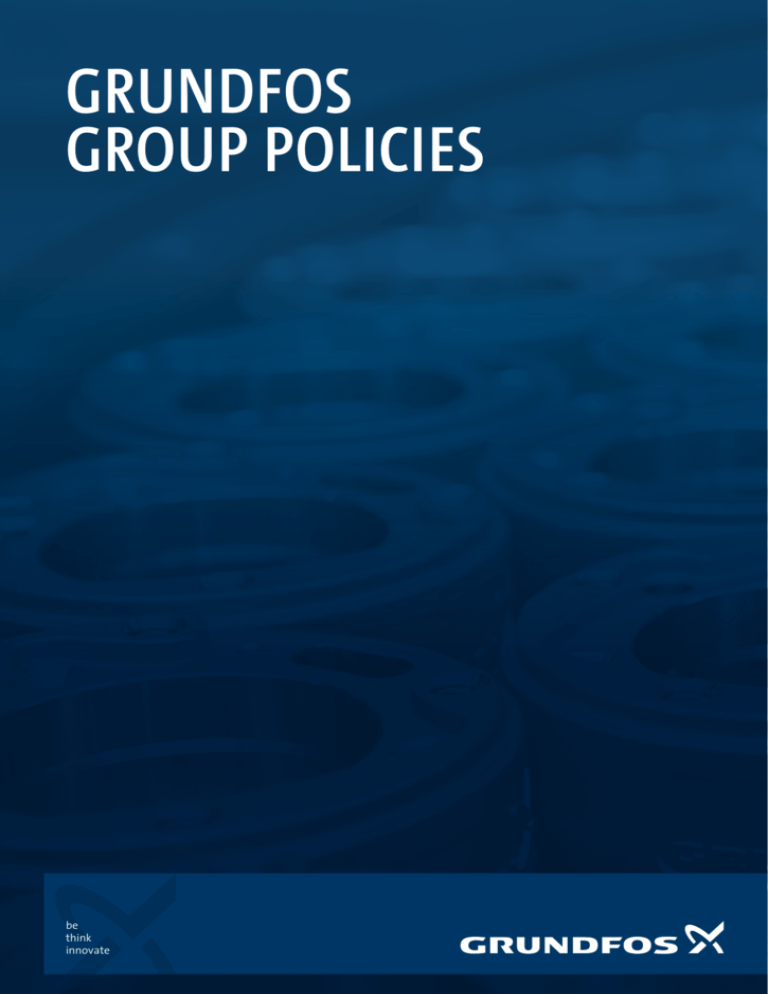
GRUNDFOS
GROUP POLICIES
be
think
innovate
contents
PREFACE4
business concepts policy
6
Market Policy
8
BUSINESS DEVELOPMENT POLICY
10
research & development policy
12
production policy
14
purchase policy
16
Quality policy
18
finance policy
20
people policy
22
sustainability policy
24
environment, health and safety polICY
26
communication policy
28
information Technology policy
30
THESE POLICIES APPLY TO ALL COMPANIES
THAT BEAR THE GRUNDFOS NAME.*
THE GROUP POLICIES ARE ONLY IN FORCE
IF THEY DO NOT CONFLICT WITH LOCAL
LEGISLATION IN COUNTRIES WHERE THE
GROUP HAS LOCAL OPERATIONS.
* Biral and DWT may choose to operate under different policies.
Published 2014
Each policy is owned by the functional head of the area covered in the Group policy and can
have one or more underlying policies. It is the right and duty of the policy owner to maintain and ensure deployment of their respective Group policy and all underlying policies.
Group Management has the approving authority for all Group Policies, whereas the head
of the functional area has the approving authority for the underlying policies.
All managers in Grundfos are responsible for the implementation of all relevant policies
within their area.
PREFACE
A prerequisite for being able to do your best for Grundfos is that
you know what Grundfos aims to achieve. This is why we put
so much emphasis on working with our Purpose and our Values,
and why we talk so much about our strategies and objectives.
For the same reason, we have now updated the fundamental
Grundfos Group policies, which describe the way we work and
the basic business principles that our company is built on.
When everybody throughout the Group knows these policies we
can act as one unified business across countries and companies.
At the same time, the policies will indicate where local deviations may be made, ensuring that we can compete successfully
in multiple markets and cultures.
The majority of the policies are not new. But the world and
Grundfos are constantly developing and our policies have to be
relevant at all times. We believe that with “Group Policies 2013”
we have managed to make the most relevant adjustments, while
at the same time preserving the solid foundation and the pervading logic that have always characterised our Group policies.
We do not consider our policies to be rigid rules but rather a
set of shared common practices upon which all employees in
Grundfos are expected to base their everyday actions and decisions.
Enjoy reading the Group Policies 2013.
On behalf of Group Management.
Approved by the Board, December 2013
4
5
BUSINESS CONCEPTS
POLICY
The way we do business
Grundfos will
maintain and expand
its position as global
leader in advanced
pump solutions and
a trendsetter in
water technology
Grundfos will utilise its technology and
know-how for research, product development, manufacturing and sale of products
and solutions to maintain and expand its
position as a global leader in advanced
pump solutions and a trendsetter in water
technology. We contribute to global sustainability by pioneering technologies that
improve quality of life for people and care
for the planet.
Grundfos creates value for its customers by
offering good customer service, high-quality
products based on fully tested designs
made from the best materials available,
and technologically innovative solutions
that reduce the energy consumption and
improve the environment.
The product portfolio should be deep
enough to cover multiple customer needs
within specific applications, thus creating
a competitive advantage for the Grundfos
Group. The range of products and solutions
should be wide enough to avoid dependency on a single product but no wider than
profitability can still be maintained.
Grundfos aims to achieve a high degree of
added value in production and a high degree
of automation through mass production
and series production – while at the same
time showing consideration for the environment, by, among other things, reducing
CO2 emissions and water consumption.
Grundfos must remain financially independent of other companies, organisations
and institutions in every respect, and any
expansion of activities must be based on
sound financials. High profitability is not
an aim in itself – but a mean to maintain
a healthy economic growth of Grundfos,
which secures independency and a good
place for people to work.
Grundfos values great leadership, which
is a prerequisite for successfully delivering
on short-term commitments while at the
same time building the Grundfos of the
future.
The Business Concepts Policy must ensure that all Grundfos
Group activities are aligned with the core principles of the
way we are doing business. It covers a broad understanding
of the Grundfos business model, value proposition and
ownership structures.
6
panies may be established. Here, the Group
will aim to have a controlling interest. If it
is not commercially attractive to establish a
company, the Group will enter into cooperation agreements with local distributors
that represent Grundfos.
Throughout this globalisation effort, the
Group headquarters in Bjerringbro continue
to be a focal point for all Grundfos activities. It is the intention of the management
– in agreement with the founder’s wishes
– to work actively to maintain a large and
diverse workplace in Bjerringbro covering
both headquarter activities and sizeable
production and R&D units, which is also
the case today.
Grundfos performs its activities on the
basis of long-term strategic planning combined with short-term targets. At the same
time, Grundfos pursues an agile business
practice, which enables quick responses
to new opportunities. To secure efficiency
in day-to-day operations, we aim to align
our key business processes across the
Group while at the same time advocating
for strong local leadership in the individual
markets to secure a local touch and agility.
Each company within the Group should feel
free, independent and empowered in their
day-to-day work and adapt its growth to
the potential of the local community. However, these activities should be performed
while honouring Group values, strategies
and leadership principles. In addition, all
relations must be based on high ethical
standards.
The Business Concepts Policy offers the
framework for a unified approach to doing
business and bringing value to Grundfos
customers, benefitting both the growth of
the Group, the environment and the communities in which Grundfos has companies
and where Grundfos products, solutions
and services are used.
By pursuing a globalisation agenda, we
continuously expand the global reach
of the Group. We strongly believe in the
value of being close to our customers and
markets, and we will set up wholly owned
companies or branches in markets where
it is considered commercially feasible. In
markets where legislation requires participation of a local partner, joint venture com-
7
MARKET POLICY
adding value to our customers
Activities, whether within marketing, sales or service, must always strengthen Grundfos’ position
as a global market leader and trendsetter. This position presents us with both obligations and
privileges. To fulfil the former and enjoy the latter, Grundfos will set the highest ethical standards
and for instance never talk unfairly about any competitor.
Sales, service and marketing strategies will be implemented in cooperation with the relevant
market segments, regions, and sales companies. All stakeholders will work to achieve the largest
possible market share to maintain Grundfos’ leading position in the global pump business.
Any direct customer contact must be characterised by the high level of professionalism, knowhow and competence that is associated with the Grundfos brand and products, thus contributing
to strengthen Group partnerships. This relentlessly ambitious approach is a prerequisite for the
advantageous brand position and customer satisfaction that Grundfos is enjoying today.
Product pricing must reflect the high quality of the Grundfos product range, the maturity of the
brand in the market and the overall interests of the Group. Third party products may be included
in the product range in order to complete a specific order, but in such case the third party product
shall be sold under the third party name.
The Group Branding Strategy must ensure that customers, potential employees and other stakeholders increasingly will think of Grundfos as the most responsible, most future-oriented and
most innovative pump company in the world. Group marketing activities must be standardised
according to the Grundfos Branding Guidelines and Visual Identity in order to ensure competent and uniform marketing efforts all over the world. The brand promise expressed in be think
innovate must always be the guiding principle but may, with time, be expressed using different
themes.
Partners, regardless of whether they are suppliers or authorised subcontractors, must meet the
quality standards that have been set by Grundfos and comply with any guidelines that have been
issued by the Group. In order to promote the sale of Grundfos products, Grundfos may license
a third party to manufacture certain components or products if it improves Grundfos’ ability to
fulfil its strategy. The granting of a license shall be subject to agreement with Group Management
according to license sub-policy.
In order to protect the Grundfos image and to establish good customer relations, Grundfos shall
provide the best possible after-sales service. Local Grundfos companies are entitled to contract
with local service partners to carry out service obligations. Such service partners may become
authorised through mandatory assessments to ensure that Grundfos service is always performed
by well-trained staff and comprises Grundfos products as well as pumps of other brands, according to service sub-policy.
The selling company must always ensure that the products can be serviced in the relevant market
area.
The Market Policy must ensure that all Grundfos Group
activities add value to our customers’ businesses. We consider
8
all customer-related initiatives to be a lever for the continued
Any direct customer
growth of the Group, and they must therefore be characterised
contact must be
by excellence and offer added value and globalisation. This
characterised BY A high
policy covers our intentions for dealing, communicating and
level of professionalism,
interacting with customers and other stakeholders during all
know-how and
phases of the marketing, sales and service processes.
competence.
9
Business Development
Policy
TO BUILD AND SAFEGUARD LEADERSHIP
POSITIONS
The business development policy outlines the cross-organisational and outside in effort of identifying, assessing and
addressing business opportunities at a global scale. It supports
our growth and differentiation agendas, relates to both
existing and new business areas, and encompasses a wide range
of competences, processes and activities.
Serving as a response to our Purpose and catering for both short-term and long-term objectives,
business development initiatives always take their
starting point in a sound understanding of market
drivers, customer needs, broken value chains, stakeholder preferences and competition. This understanding includes insights and analysis which build
on a combination of general intelligence gathering,
such as Corporate Foresight, market and competitor
surveillance and project-specific research, e.g. user
studies and market studies, all of which relate to
competences and disciplines that are found within
the business development organisation.
Business development initiatives are often different
by nature and range from optimisation of existing
business models and associated portfolios to exploration and pursuit of new segments or fields of
activities. They are generally anchored in the overall
Group Strategy and are being cascaded into, driven
and governed within our global business development strategy framework.
Our core business is centred around our defined
market segments. Here, our aim is always to capitalise on existing products and capabilities while at
the same time focusing on the entire value chain
in an effort to identify and add stakeholder value
through differentiated new offerings, i.e. pumps and
variants, systems and services. In this respect, the
alignment of our business focus is pivotal (Whereto-Compete and How-to-Compete) as are strategy
planning and initiative execution. Everything is
orchestrated by our Global Business Teams, but
encompasses contributors throughout the organisation, including, but not limited to, Operations,
Supply Chain Management, Group Service, IS and
People & Strategy. The Global Business Teams
have, for example, performed initiatives such as
the upgrade of key product lines and the successful
development and introduction of new products.
Our core business
is centred around
also a market context that is new or at least slightly
unfamiliar to Grundfos. They are normally hosted in
a special business development environment and
subjected to different KPIs and governance. The aim
is to learn or fail quickly and cost-efficiently, to mitigate risks, and to arrive at a decision to either perform controlled integration into and acceleration
within the core business itself, to establish a separate business structure, or to discontinue or divest
the specific development activity.
The diversity of our business development challenges in terms of focus, timing and risk must be
reflected in the organisational composition and
governance and also in our ability to master different types of innovation; spanning from incremental
to truly radical or breakthrough innovation and the
associated mindset, competences, methods and
tools.
Similarly, we consider partnering to be a natural
way to advance new ideas and concepts and help
develop and sustain a competitive edge.
To safeguard our values, protect the Grundfos brand
and build and benefit from competence pools and
economies of scale, our global business development efforts must be governed centrally – while at
the same time catering for regional differences in
relation to market needs and approaches. This does
not exclude the possibility of experimenting with
e.g. set-ups and/or approaches to address what
may be considered more fundamental challenges
linked to a deeper penetration of selected larger
and notably distinct markets.
Business development initiatives which do not
readily link to our core business are typically derived from our ambition to develop new growth
platforms as part of the Innovation Intent. Often,
such initiatives represent not only technology but
our defined market
segments.
10
11
RESEARCH &
DEVELOPMENT policy
We focus on
product design
as a core
component.
innovation in sync with the market
The Research & Development (R&D) Policy serves the dual purpose of
ensuring that the development of technologies and new products is truly
market-driven and strategy-driven, and that the effort itself is organised
and orchestrated in a way that ensures synergies through central global
governance and alignment, thereby adding maximum value to all stakeholders involved. The policy applies to all Grundfos branded R&D activities
within the Group.
Since new technology and high-quality products are important vehicles for differentiation, branding and ultimately
the fulfilment of our Innovation Intent, Purpose and leadership aspirations, the R&D Policy also aims to safeguard
the principles and guidelines upon which such overriding
intentions and ambitions are built. This includes a pursuit of
innovation in everything we develop and our commitment to a
triple bottom line philosophy based on the responsible use and
re-use of materials and the endeavour to always be the best in
terms of energy efficiency.
R&D initiatives are driven by our business development
strategies, supported by dedicated research agendas and
must be subjected to a thorough idea generation exercise to
establish both strategy match and commercial viability, and to
ensure differentiation, value and branding compliance.
12
The Product Development Process (PDP) itself is designed to
and must be applied to ensure fundamental customer and
market insights, learning loops and continuous stakeholder
alignment as a mean to meet expectations and deliver the
right solutions.
We focus on product design as a core component, both when it
comes to customer experience and cost effectiveness, but also
to support branding and preservation of intellectual property.
The product design and construction must contribute to low
total costs including low service cost. Stainless steel is a characteristic Grundfos feature and should be used as engineering
material as far as justified by technical and financial considerations.
To ensure the successful launch of a new product, it is
necessary to identify requirements in terms of sales and
marketing, availability, and after-sales service at an early stage
of a product development project, and these requirements
must be agreed on and timely addressed by the respective
internal stakeholders. This is also reflected in the PDP framework which forms an essential part of project governance.
Once products are introduced, they become an integral part of
a given product family strategy and portfolio and governed on
an ongoing basis to ensure continuous market competitiveness and lifecycle business optimisation.
proximity and access to global competence pools without
compromising on quality and efficiency.
Significant own research and technology will always remain
key drivers in our product development efforts, and in order
to be able to bring innovative and competitive integrated
solutions to the market, it is our policy to maintain a high
level of competence on all in-house key technologies.
Wherever relevant, we must, however, also be open to the concept of cooperating – or even partnering – with third parties in
order to acquire know-how and/or services, while at the same
time maintaining and protecting our core competences and
intellectual property rights according to patent sub-policy.
Strong governance, rigid and certified process management
and organisational capacity building allow Grundfos to globalise its R&D effort; capitalising on economies of scale, market
13
PRODUCTION POLICY
a supply chain that never stops
The manufacture of Grundfos products should mainly take
place within the Group. This means that the Group manufacture
products and components that contain technologies which are
strategic to Grundfos, whereas the manufacture of other components may be outsourced to competitive sub-suppliers.
The Grundfos production is organised in a global network of
equal and cooperating production units. Grundfos will decide
the geographical location of the production units on the basis of
commercial considerations, including efficient and prompt customer service, security of supplies, marketing, production costs,
local social conditions and the availability of qualified labour.
Grundfos use efficient and integrated production systems and
thus ensure that production achieves a high level of delivery
service in the form of competitive delivery times, high flexibility and the ability to meet agreed delivery times. Standard production equipment must be purchased from external suppliers
whereas Grundfos’ know-how will be used for the development
and manufacturing of purpose-built machinery and equipment.
Production must participate actively with its own employees
and competences in the development and introduction of new
products. Furthermore, Production must identify new production technologies and further develop existing production technologies. In performing these tasks, Production must consider
energy conservation, consumption of resources and the environmental impact to be just as important as setting targets in
order to improve profitability, logistics and quality. Grundfos will
use the most rational production methods with due regard to
customer service, the environment and profitability.
Before investing in additional production capacity, Grundfos
will make sure that existing production capacity is fully utilised
taking into consideration reliability and flexibility of supplies as
well as stock levels.
When making decisions based on the Production Policy concerning production facilities, production capacity, technologies
and local assembly, we will pursue an efficient production and
supply chain set-up to meet customer expectations. In general
Grundfos assembles all finished products. However, assembly of
Grundfos products may be placed at external partners if market
conditions so require and if it is approved according to the local
assembly sub-policy.
The Production Policy describes the way in which production
14
units and the supply chain are developed, driven and contribute
the Group manufacture
to optimise the competitiveness of the Group. The main objective of
products and components
the production companies – in cooperation with other Group
that contain technologies
functions and Sales – is to supply Grundfos customers worldwide
which are strategic
with high-quality pumps and pumping systems.
to Grundfos.
15
Purchase POLICY
Best buy – Ethically & Economically
The Purchase Policy is designed to set out
general rules for purchasing activities in order
to offer the best possible support to the objectives
and strategies of the Grundfos Group.
The policy must ensure that synergies between companies within Grundfos are
utilised to the greatest possible extent in relation to external suppliers. To obtain
synergies, we must follow a set of global purchasing processes which are always
updated and sustainable, i.e. ethically and environmentally sound.
All Grundfos employees must work according to the Grundfos Code of Conduct.
Written agreements which represent a certain value concluded with external suppliers
must always be made in cooperation with relevant stakeholders and must comply
with relevant legislation and the commercial conditions of Grundfos.
Purchasing activities must be governed by total cost of ownership. In addition to
price, factors such as quality, environment, ethics, delivery time and delivery terms,
supplier reliability, technical competences, service, capital commitment and payment
terms must be taken into consideration when evaluating an offer made by a supplier.
Company culture and values must also be taken in to consideration to ensure a match
between the supplier and Grundfos.
Suppliers should be evaluated with due respect to the Supplier Approval Process which
also includes a sustainability evaluation in relation to ethics, environment and finance.
New suppliers must be selected on the basis of a professional business evaluation in
order to ensure sound competition (normally, at least three suppliers should quote),
and according to their ability to fulfil the expectations on competitive terms. The
written agreement with the new supplier(s) should be agreed upon before the actual
purchase is made.
Grundfos purchase is always based on documented purchasing specifications. All purchasing activities will be based on the demands from the companies and functions
within the Group. All purchasing will be based on a purchase order. Exemptions may
be allowed.
In general, Grundfos endeavours to ensure that business with a supplier should never
exceed 50 per cent of the supplier’s annual turnover. Where possible, purchases should
be made directly from manufacturers.
In order to achieve close cooperation, a high level of security of supplies and mutual
advantages, Grundfos will aim to be attractive to suppliers by means of framework
agreements, close supplier relationships and partnership management.
Such cooperation involves the commitment to exchange experiences and strategic
information regarding long-term requirements and development plans, thus working
together towards creating customer value and reducing supply chain costs.
All Grundfos employees
who are engaged in purchasing
activities must work
according to the Grundfos
Code of Conduct.
16
17
QUALITY POLICY
Quality in every detail
The Quality Policy must ensure that all companies
and activities in the Grundfos Group are focused on
“Total Quality” as an integrated part of the entire
organisation, and that quality assurance is considered
a decisive parameter for continued growth.
Quality management in Grundfos should
always be based on documented quality
specifications, continuous improvement and
development in line with the Zero Defects
Philosophy. It must be implemented at all
stages from product development through
purchasing, production and distribution to
marketing, sales and service.
Group Management and local company
management are responsible for implementing the Quality Policy and ensuring the effectiveness of the Quality Management System
and derived activities. All companies with
product development and production activities must obtain certification of their Quality
Management System.
All employees have the right and obligation
to point out defects, and quality is given top
priority if faults or risk of faults are detected.
Quality Management in product development must always aim to develop robust and
reliable products, which have the functions
requested by the customers and which can
be produced according to the Zero Defects
philosophy. Quality Management in production is centred around “Right first time”
and must aim at zero defect manufacturing
based on high process capability and always
expect the employees to take full responsibility for their own work.
To ensure accurate decision-making, setting of priorities and targets and executive
resolutions, it is vital to ensure the validity
of the quality data obtained in the Group.
Therefore, Group functions and local company management must take the necessary
actions to provide reliable data.
Before committing to a partnership with a
supplier, the supplier’s quality management
systems and capabilities must be verified
and approved. The purchasing departments
should revise their suppliers regularly via the
Supplier Quality Assurance (SQA) to ensure
continuous improvement. Sourced products
and services must always fulfil the same
requirements as Grundfos’ own products and
services.
To ensure that products and services provided by the Grundfos Group are satisfactory
to our customers, market satisfaction must
be frequently monitored and documented.
Prompt reactions are required in case of unsatisfactory findings.
A united focus on “Total Quality” across the
Group is required to ensure that we meet
the expectations of our customers and other
stakeholders and continuously improve quality performance throughout the Grundfos
Group.
The Quality
Management in production
must aim at zero defect
manufacturing.
18
19
Finance
Policy
The Finance Policy must ensure that companies
and employees within the Grundfos Group act in
accordance with local laws as well as internal
a basIS for healthy growth
Proper planning and
forecasting processes
are a prerequisite for
financial foresight.
guidelines and instructions regarding Finance
activities.
All companies must ensure proper and timely bookkeeping according to local laws and
the Grundfos Finance Manual. Financial reporting, internal as well as external where
required, must be performed proactively, timely and with high quality, following time
schedules provided by Corporate Finance and set by local authorities.
Proper planning and forecasting processes are a prerequisite for financial foresight. Local company processes must support that. Profitability in markets, segments and products should be considered from a Group perspective, and the Group contribution margin
is thus one of the key figures to be optimised and carefully monitored. Grundfos Group
solidity must always be kept on a high level to ensure independency.
An appropriate internal control level should be established by all companies according
to the Grundfos Control Handbook and related guidelines provided by Corporate Internal Control. Internal controls must form an integral part of daily routines and processes
to the highest possible extent.
As regard to tax, Grundfos runs its business responsibly and plays an active role in society.
This means that Grundfos will act as a responsible citizen and will strive to ensure a fair
and reasonable allocation of the Group profit in the jurisdictions/communities where
Grundfos is present as well as being in compliance both for direct and indirect taxes.
The Grundfos Group will ensure that all companies are able to honour their obligations
in due time and that an appropriate capitalisation of all companies is available.
Capital needs in terms of loans and overdraft facilities should be requested internally
at Group Finance and thus, external financing should only be requested on certain and
preapproved occasions. Excess cash should be deposited at Group companies based
on guidelines from Group Finance. The cash flow should be carefully monitored, and
working capital should be kept at the lowest possible level.
By considering risks and by taking a holistic, enterprise-wide approach to strategic,
operational and project risks, we ensure that our risk response is appropriate to our risk
appetite and business objectives. All companies must ensure that current and future
material business risks are continuously identified, assessed, quantified and managed
appropriately.
A key element in our risk management activities is to transfer risk exposure to the insurance markets and our own insurance captive where possible. Many material risks can
be insured and our risk mitigation strategies should be closely aligned with our Group
insurance setup. Relevant processes, guidelines and tools are provided by Group Risk &
Insurance.
Grundfos reduces financial and business risks caused by foreign exchange, interest and
price fluctuations by using financial instruments in accordance with the guidelines
defined by Group Finance.
20
21
people POLICY
to engage people in our purpose
The desired outcome of this policy is for Grundfos to reach its business goals in the
short term and long term through the efforts and engagement of our people.
To fulfil our Purpose and reach our business goals, Grundfos must provide an attractive, productive, healthy and safe working culture. This is to enable our people to
unfold their potential to the best of their ability and give them job satisfaction and a
sense of well-being. Our Values require that each individual feels respected and valued
and has the power to contribute and influence. By living our Leadership Principles,
we expect our managers to be able to develop a culture where this will happen.
Correspondingly, the individual employee is expected to make full use of his or her
talent in order to contribute to our culture and fulfil our Purpose.
We consider an on-going dialogue between manager and employee to be a central
part of such a culture. It is in dialogue that they establish a common understanding of
the development objectives and needs of the individual, and a mutual commitment
to pursue these. Similarly, their dialogue provides the framework for a common understanding of our short-term and long-term business goals, and for translating these
into individual goals and evaluating the employee’s performance. It must be ensured
that settlement of disagreements is handled in a dignified manner.
For our people to meet their performance and development objectives, we consider
training and learning to be an essential element. We want people to actively seek
learning opportunities and to work in cross-functional teams. We therefore strive to
provide such opportunities to ensure that employees can engage and thrive in the face
of ambitious business goals.
With respect for local regulations, cultures and practices, the total reward offered to
employees must also contribute to making Grundfos attractive to the talent needed
by the business. We aim to be a market leader on career, development and cultural parameters and competitive on elements of compensation and benefits. In all of
Grundfos we are conscious of having a healthy “work-life balance”, and we show social
responsibility towards employees and society.
Our strategies and activities to attract and select new people must support a positive and professional impression of Grundfos that is in keeping with our Values and
portrays the company as a preferred employer to relevant candidates. We encourage
applicants from all backgrounds, and all applicants are treated with respect, fairness
and dignity, whether or not they are offered a position. Grundfos aims at giving priority
to internal recruitment.
When we relocate people to another country for a long or short period of time, we
do so to exploit a business opportunity or to add value in specific parts of our organisation. We ensure that our people are relocated, welcomed and repatriated with fairness
and consistency irrespective of the employee’s background or position in the company.
Grundfos encourages employees to speak up when they see breaches of our company
values, code of conduct, ethics and Group Policies.
The People Policy must ensure that Grundfos engages talented
people who are motivated to join forces and work wholeheartedly
for the Grundfos Purpose. The policy covers all activities related to
developing the capabilities of the individual and the organisation
with reference to our Values and Leadership Principles.
Our Values require
that each individual feels
respected and valued and has
the power to contribute
and influence.
22
23
SUSTAINABILITY
POLICY
putting
sustainability first
It is our intention to behave sustainably in everything that we
do and the policy addresses all Grundfos companies, functions
and activities.
Sustainability is reflected in everything that we do, every decision we make and every action we take. We strive for sustainability at all times.
Grundfos wishes to be a responsible and ethical company
that acts with integrity. We must ensure that we live up to all
applicable laws, rules and regulations, as well as voluntary
commitments such as the UN Global Compact. We wish our
Code of Conduct to be a guide to all Grundfos companies and
employees.
Sustainability in Grundfos means that we will conduct business in a sustainable way by engaging in the interests of our
people, the environment and society as a whole. This covers all
our activities from raw material to the end of our products’ lives.
All of this becomes possible by a sound and balanced business
that creates solutions for the urgent challenges the world is
currently facing. Sustainability is therefore to be part of what
we do and how we do it throughout the entire value chain.
Grundfos plays an active role in society, for example by promoting public awareness about sustainability, contributing to
local communities, improving our environmental impact and
taking responsibility in our supply chain by influencing suppliers’ conditions within e.g. labour rights and the environment.
By means of cooperation with our customers we make products
and solutions that help our customers save natural resources
and improve climate impact.
We take care of our people, and we therefore continuously strive
to ensure a healthy and safe working environment. We wish to
create a workplace which promotes diversity, encourages an
inclusive workforce and takes care of people with special needs.
We admit that “Absolute Sustainability” is not in reach; however,
we are on a continuous journey for achieving a higher degree of
sustainability in all what we do.
Grundfos is our people, and our people are the drivers of
sustainability. We empower and enable our people to think and
act sustainably at all levels. We do this by educating, motivating
and engaging our people.
The Sustainability Policy must ensure that all Grundfos Group
activities and decisions are based on the triple bottom line of
economic, social and environmental concerns. Grundfos is
24
conscious of its social responsibility; therefore Sustainability
Grundfos is our people,
initiatives must be embedded in the capabilities of all Grundfos
and our people are the
functions and companies.
drivers of sustainability.
25
environment, health
and safety POLICY
empower to meet our commitments
We will continuously
assess and improve the
environmental impact of
all our activities.
The Group Environment,
Health & Safety (EHS) Policy
must ensure that all Grundfos
Group activities are focused on
sustainable development and
empower the organisation to
behave in accordance with its
commitments.
The purpose of the Group EHS Policy is to describe our approach
to the overall EHS work in all Grundfos companies, business
units, functions and activities to ensure that we meet the expectations of our customers, the communities in which we operate
and other stakeholders.
With our global presence and activities, Grundfos acknowledges
and gives high priority to our environmental responsibility. We
will continuously assess and improve the environmental impact
of all our activities, and by means of concrete actions we engage
our employees to set a good example of how to show respect
and care for the environment.
The health and safety of our employees are given top priority.
Therefore, we will continuously improve the working environment by taking preventive action and ensuring that the working
conditions are in accordance with strict occupational workplace
standards. In addition, we will always treat our employees with
dignity and respect. All production buildings, plants and technical equipment must be maintained to a high standard of safety
and appearance, and comply with local legislation.
26
We educate, motivate and engage our employees to understand, promote and contribute actively to implement the EHS
Policy and the accompanying commitments. Our employees
are encouraged to react proactively to prevent any activities
they feel are not in alignment with the policy and commitments by taking initiative and contributing to a positive EHS
development.
We will use certified management systems to fulfil and continuously improve all EHS-related aspects. We will commit
ourselves to comply with all applicable regulatory EHS legislation and internal requirements that we subscribe to wherever we operate. We want to become a role model by setting
higher standards for ourselves and go further than required
by law. We continuously promote and influence local and
global legislation that protects the environment, the health
and safety of our employees, workplaces and the community,
and to provide flexibility to meet the needs of our business.
as well as by preventing fatalities, incidents, injuries and ill
health that cause harm to our employees and put our business at risk.
From a lifecycle perspective, we assess and improve the
environmental impact of our products, processes, facilities and
suppliers. We continuously search for sustainable solutions to
improve the environment that we all live and work in.
We encourage a mindset that focuses on the environment,
health and safety and responsibility through the involvement
of all employees and leaders, communication and sharing
of best practices. We align the global approach to the EHS
work by communicating our achievements at all levels of the
organisation.
We strive to become an attractive workplace by promoting
the value of safety and personal health to our employees,
27
COMMUNICATION
POLICY
we do what we say,
and say what we do
The Communication Policy must ensure that all
Grundfos Group communication is consistent
and presents Grundfos the way we want. Based
on high quality, honesty and openness, we strive
to do what we say, and say what we do.
This relates to communication to and through the press
as well as corporate branding, public relations and public
affairs communication. The policy must also guide all internal communication via our own mass communication
media. Grundfos will endeavour to inform employees
before the outside world and to show willingness to give
both good as well as less good news.
Sustainability, reliability and responsibility form part of
the foundation for growth in Grundfos. Our communication needs to support this and thereby create value for our
customers, owners, employees and other stakeholders.
Efficient information and active communication are a prerequisite in order for Grundfos to achieve our commercial
goals in accordance with our Purpose and for being a
desirable workplace.
In order to ensure equal treatment of all stakeholders,
in principle, no distinction is made between internal
and external communication, in the sense that what all
employees know everybody else may know too. Above
all, employees are the most important stakeholders with
regard to company communication. All communication
must support the overall picture of the company, its goals
and culture, and all communication must be based on
what serves Grundfos best.
All managers are accountable for providing their employees with timely and efficient communication about all
important topics. Managers receive support for this from
Corporate Communication and from regional and local
communicators – whenever possible – who operate
through established internal channels and by supporting
with various tools for line communication.
the employees are the
most important stakeholders
The media is an important partner in order for Grundfos to
gain access to the public. A good partnership with the media is not only obtained by Grundfos being open and welcoming when we are contacted by reporters, but also by
Grundfos being proactive towards the press and the media
and thereby offering active information and professional
debates.
with regard to company
communication.
28
29
INFORMATION
Technology POLICY
a value driver for Grundfos
The Information Technology policy must ensure that
all Grundfos Group activities related to information
system solutions and technologies are carried out and
maintained according to a corporate set of rules, to
ensure that the required internal and external business
values are achieved.
Information system solutions and technologies are implemented
in order to drive value for Grundfos – to support company growth,
to build new businesses, to get a competitive advantage, to provide information to decision makers, to integrate and automate
processes and to support electronic integration with stakeholders.
The IT strategy lays down the terms of purchase, design and introduction of system solutions in all Grundfos companies.
IT solutions must follow the decided IT Architecture Principles.
Standard solutions provided by strategic partners are our preferred choice. Any IS partner or subcontractor must follow the IT
Architecture Principles.
IT solutions and activities are based on the principle of “global
reach and local proximity”.
Grundfos depends on efficient and reliable IS solutions, and the
adoption, operation and use of IT solutions must be in accordance
with our IT Security Policy.
Online business and collaboration platforms influence the way
Grundfos employees engage with partners, and it is in everybody’s interest to understand and be aware of how to engage and
interact in social collaboration networks for the benefit of us all. In
order to do so, our “Social Business Policy” must be followed.
To maintain the agreed level of security and stability of the shared
IT infrastructure, and to ensure that Grundfos users’ privacy, letters and personal information are protected in accordance with
current legislation, the “Rules for the use of Grundfos IT resources”
policy must be followed.
Grundfos depends
on efficient and reliable
IS solutions.
30
31
The name Grundfos, the Grundfos logo, and the payoff Be–Think–Innovate are registered trademarks owned by Grundfos Holding A/S or Grundfos A/S, Denmark. All rights reserved worldwide.
0314/GROUP PRODUCTION/10956-D&I
be think innovate
Grundfos Holding A/S
Poul Due Jensens Vej 7
DK-8850 Bjerringbro
Tel: +45 87 50 14 00
www.grundfos.com

